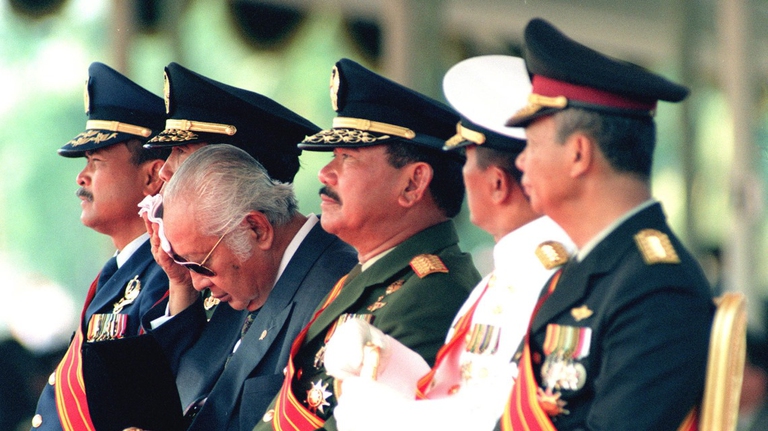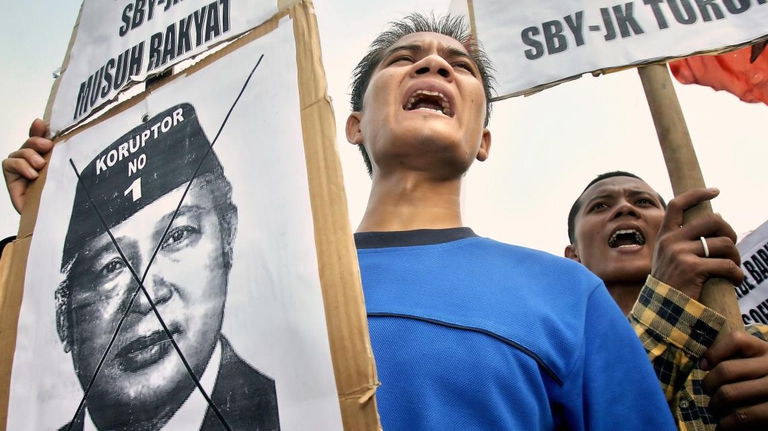
As per tradition after 12 years India held Mahakumbh, the world’s largest spiritual congregation that has been attracting pilgrims from across the globe.
La sentenza arriva dal Tribunale internazionale del popolo (Ipt): quello in Indonesia fu un genocidio che vide 400mila sostenitori del Partito Comunista uccisi tra il 1965 e il 1967 per mano di Suharto.
The International People’s Tribunal (IPT) has said that Indonesia is responsible for the genocide of 1965, when more than 400,000 supporters of the Indonesian Communist Party (PKI) were killed. Zak Yacoob, chief justice of the tribunal formed at the Hague in 2015 after efforts to bring the mass killers to justice had failed, said that Indonesia must act “urgently and without qualification” to address the genocide. Yacoob also told Al Jazeera that “aside from prosecuting those involved in the killings, the government must also apologise to all victims or their survivors, as well ensure appropriate compensation and reparation”.
The killings of the supporters of the PKI, the world’s third biggest communist Party after China and Russia, started on 2 October 1965. General Suharto, responsible of army reservists and successor of Sukarno from 1967, launched a campaign to wipe out all the party’s officials and supporters. He invaded the capital Jakarta and assumed the presidency with a coup.
The support of CIA, the US embassy, and the UK secret service has been essential for the General to establish himself. The United States has in fact trained Indonesian officials in the school of Bandung. CIA also played a crucial role in planning the anti-communist propaganda for the leaders of the coup, by spreading false information on atrocities perpetrated by communists and inciting racial hatred against Chinese people and atheists. The United States’ embassy and intelligence agency also drew up a list of 5,000 PKI supporters to be wiped out, easing the army’s aim of physically destroying the Party.
The report has detailed 10 human rights violations carried out against civilians, including imprisonment, torture and sexual violence. The massacre also killed members of trade union movements, academics, artists, democratic parties, student leaders, journalists, Chinese people and civilians. Some estimates show that more than a million people have been killed. The bodies of the victims were dumped into rivers, buried or abandoned along the streets. The killings were also carried out by “death squads”, like the Pancasila Youth, whose school of thought still exists in the currently governing Partai Demokrat.
The main responsible for the genocide, General Suharto, has never been punished. He died at his home in Jakarta in 2008. Suharto assumed the presidency in 1967 and ruled until 1998, giving life to one of the world’s most corrupted governments, blocking media and signing monopolistic agreements for the benefit of his circle of friends and relatives (including his 6 sons). Moreover, he ordered the invasion of Portugal’s former colony Timor Est in 1975, killing thousands of civilians and opponents (100,000 people according to estimates). The extent of these actions was recognised by the United Nations no earlier than 1993. In 1996, when Suharto expelled Sukarno’s daughter Megawati Sukarnoputri from the lead of Indonesia’s Democratic Party of Struggle (one of the three legally recognised parties), a number of riots were organised in the capital that led Suharto to resign in 1998.
“It’s a very important verdict for a case that’s been haunting Indonesia for the past 51 years,” said Step Vaessen reporting from Java, where most of the massacres happened. “The question now is, what’s the Indonesian government going to do with these findings?” So far, all governments have completely rejected the existence of the people’s tribunal. With no legal basis, this verdict has no practical and legal implications but only a symbolic value. The hope now is that the results may urge the government to take action. As long as it keeps being talked about.
Siamo anche su WhatsApp. Segui il canale ufficiale LifeGate per restare aggiornata, aggiornato sulle ultime notizie e sulle nostre attività.
![]()
Quest'opera è distribuita con Licenza Creative Commons Attribuzione - Non commerciale - Non opere derivate 4.0 Internazionale.
As per tradition after 12 years India held Mahakumbh, the world’s largest spiritual congregation that has been attracting pilgrims from across the globe.
Workers in tea gardens of West Bengal, India, that produces Ctc tea for domestic consumption complain that they have been devoid of basic facilities while political parties make hollow promises during every elections which are never fulfilled.
India is in the middle of the elections, but sadly none of the politicians have uttered a word on man-animal conflict that has been devouring several lives every year.
Manipur, a state in north-east India, is still reeling under the tremors of violence that broke out last year devouring lives and paralyzing the economy.
The government of Tanzania is currently planning to evict more than 80.000 indigenous Maasai people from their ancenstral land
A new UNU-INWEH report on the global bottled water industry reveals the massive scale of this market and the lack of strict quality controls.
Isatou Ceesay founded a social enterprise that is helping to fight plastic pollution and empowering women and young people to gain economic independence.
In 2020, Mihela Hladin made a radical decision that many, in recent times, have probably considered. This is her story, with photos by Matt Audiffret.
The Brazilian government has started evicting illegal gold miners, responsible for the health emergency that has hit the Yanomami people.










